Cinema Paradiso Blu-ray Movie
HomeCinema Paradiso Blu-ray Movie 
Nuovo cinema ParadisoLionsgate Films | 1988 | 124 min | Rated PG | Oct 04, 2011
Movie rating
8.4 | / 10 |
Blu-ray rating
| Users | 3.0 | |
| Reviewer | 4.0 | |
| Overall | 3.4 |
Overview
Cinema Paradiso (1988)
A filmmaker recalls his childhood, when he fell in love with the movies at his village's theater and formed a deep friendship with the theater's projectionist.
Starring: Antonella Attili, Enzo Cannavale, Isa Danieli, Leo Gullotta, Marco LeonardiDirector: Giuseppe Tornatore
| Drama | Uncertain |
| Foreign | Uncertain |
| Period | Uncertain |
| Melodrama | Uncertain |
| Coming of age | Uncertain |
| Comedy | Uncertain |
Specifications
Video
Video codec: MPEG-4 AVC
Video resolution: 1080p
Aspect ratio: 1.64:1
Original aspect ratio: 1.85:1
Audio
Italian: DTS-HD Master Audio 2.0 Mono (48kHz, 16-bit)
Subtitles
English, English SDH, Spanish
Discs
25GB Blu-ray Disc
Single disc (1 BD)
Playback
Region A (locked)
Review
Rating summary
| Movie | 4.0 | |
| Video | 3.5 | |
| Audio | 3.5 | |
| Extras | 0.5 | |
| Overall | 4.0 |
Cinema Paradiso Blu-ray Movie Review
For the love of film.
Reviewed by Jeffrey Kauffman September 29, 2011The spirit of Federico Fellini wafts through Cinema Paradiso like the unexpected gust of wind that magically propels the Priest’s cabinet door open early in the Giuseppe Tornatore film, revealing a musty old icon. As opaque as Fellini’s films can be, there is one thing that shines through many, perhaps most of them, namely the director’s love of the Italian spirit. And that same affection informs much of Tornatore’s lovely film, one which actually helped to resurrect the Italian film industry from its post-Fellini doldrums. There are many analogs between any given Fellini film and Cinema Paradiso, but for the curious, it might be instructive to have an evening’s double feature consisting of Tornatore’s opus followed by Fellini’s Amarcord. Both films depict life in small Italian villages, both are filled to the brim with eccentric, rustic characters, and while Fellini’s film is certainly more in keeping with a magical realist ethos than the Tornatore film, it can’t be denied that Cinema Paradiso also has elements of curious fantasy floating through it like those puffballs that drift through the opening scenes of Amarcord. Another Fellini film which might be seen as informing at least part of Cinema Paradiso is Fellini’s magnum opus, 8 ½, for like that semi-autobiographical journey through the interior world of famous film director Guido Anselmi, Cinema Paradiso also depicts the bittersweet memories of another famous (albeit equally fictional) film director, Salvatore De Vita (played by Jacques Perrin as an adult, Salvatore Cascio as a little boy, and Marco Leonardi as a teenager). Much like many of Fellini’s films, Cinema Paradiso looks back on a supposedly halcyon time through deliberately rose colored glasses, and the result, while undeniably sentimental, is also incredibly heartfelt and affecting.
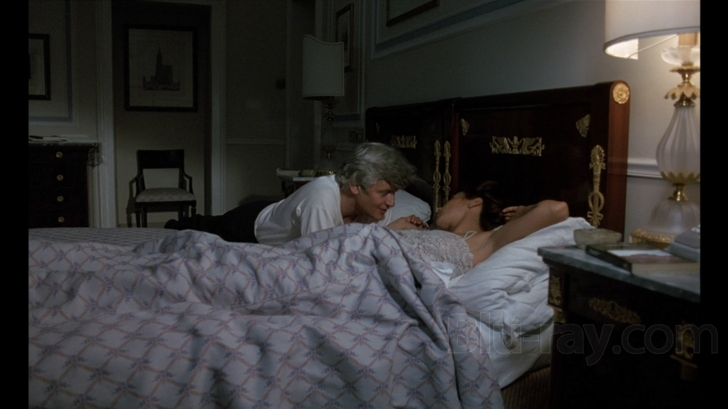
What is it with Italy and their adorable child actors anyway? I recently gushed over the incredible work of Giorgio Cantarini in Life is Beautiful, a film which came in the wake of and obviously benefited from Cinema Paradiso’s immense international success. But Cinema Paradiso has its own adorable little boy, the ebullient Salvatore Cascio. The bulk of Cinema Paradiso is told via flashback, as the now adult Salvatore (the character, not the actor) remembers with great fondness Alfredo (the incredible Philippe Noiret), his town’s projectionist at the local movie house (Nuovo Cinema Paradiso, the actual original title of the film). Alfredo is a somewhat crusy old man who initially doesn’t take kindly to the young Salvatore’s overbearing interest in film, but soon the two forge a bond which is perhaps strengthened by the fact that Salvatore’s father never returned from World War II. Cascio is simply wonderfully huggable in the scenes devoted to Salvatore’s youngest days, and it’s the child actor’s wide eyed wonder that makes this section of the film so memorable.
While the bulk of the film is a sort of budding “fromance” between a quasi-father figure and his sort of son, a number of other plot elements spill into Cinema Paradiso, including the desperate efforts of the town’s Priest (a very funny Leopoldo Trieste) to keep the townspeople from seeing any “objectionable” material in any of the films that are shown. This material includes everything that even hints at carnal relations, and Father Adelfio pre-screens every feature grasping a handy little bell with which he signals Alfredo to alert the projectionist where to excise those potentially disastrous, sinning kisses. The remnants of the excised portions litter the projection booth and provide an emotional denouement to the film that remains one of Cinema Paradiso’s most iconic sequences.
Cinema Paradiso is nothing less than a big, sumptuous valentine to anyone who has ever loved film. Salvatore’s infatuation with celluloid stands as a symbol for any of us who has ever cared deeply about the movies, and the love for the art form that infuses Cinema Paradiso will surely speak directly to the heart of any rabid film fan. Sadly, this Blu-ray release contains only the edited American release of the film, which is sure to create pangs of regret for any aficionados who are aware that Cinema Paradiso exists in two fairly radically different versions. The original international version was something of a box office bust, and contains a whole subplot devoted to Salvatore’s one true (non-film) love, a young village girl whom Alfredo, for his own probably noble purposes, attempts to keep away from the young man. That entire subplot is excised from this edited version, and while it’s somewhat ironic that Cinema Paradiso should have suffered the same fate so many vintage films suffer in the movie itself, the editing drastically changes the character of Alfredo as well as the emotional content of the climactic sequence alluded to above. Why both versions weren’t included via seamless branching is a head scratcher, as evidently Lionsgate and Miramax have released the original cut on DVD, including fairly recently.
While some may argue about what the excised footage does to the overall meaning of Cinema Paradiso, in one way both versions of the film celebrate something that is sadly lacking more and more from our contemporary film loving experience, and that is the sense of community going to a movie once engendered. Cinema Paradiso is a virtual paean to a time when gathering at a movie house was a group event, one which is linked not so subtly with religion in the film. There’s no mistaking Tornatore’s confluence of movie going with the rites of the Catholic church, and his frequent intercutting between icons or personnel associated with religiosity and the perhaps simpler joys of attending a film helps to connect these two supposedly disparate elements. Anyone who has ever loved a film, though, will agree that experiencing a great movie can indeed be a religious experience. For film lovers in particular, Cinema Paradiso comes close to that level of appreciation.
Cinema Paradiso Blu-ray Movie, Video Quality 
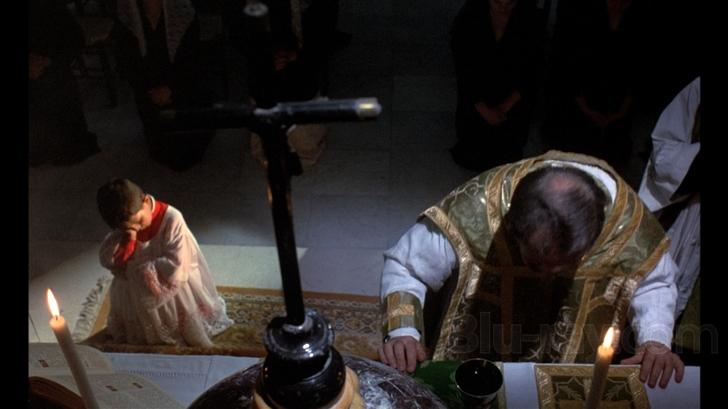
Cinema Paradiso flickers onto Blu-ray with an AVC encoded 1080p transfer in 1.64:1. Anyone who saw this film theatrically or in its previous home video releases will know that it features a rather soft, often diffuse, image, and that continues with this latest high definition release. The opening sequence, which is further hampered by the opticals of the credits, looks distressingly soft, but things improve dramatically after we get past the brief prologue featuring Salvatore's mother and then the adult Salvatore and his girlfriend. Once the film gets into the bulk of its flashback segments, colors are nicely saturated and the image, while not mind blowingly sharp, is certainly a major step up from the old DVD releases. Fine detail is best in close-ups, as is to be expected, but some of the establishing shots of the town and its inhabitants pop rather nicely, all things considered. Grain structure is also well intact, and in fact some viewers may be bothered by some of the overly grainy sequences, especially in the more dimly lit scenes. The film does suffer from some noticeable edge enhancement and fairly consistent crush in the dark interior scenes.
Cinema Paradiso Blu-ray Movie, Audio Quality 
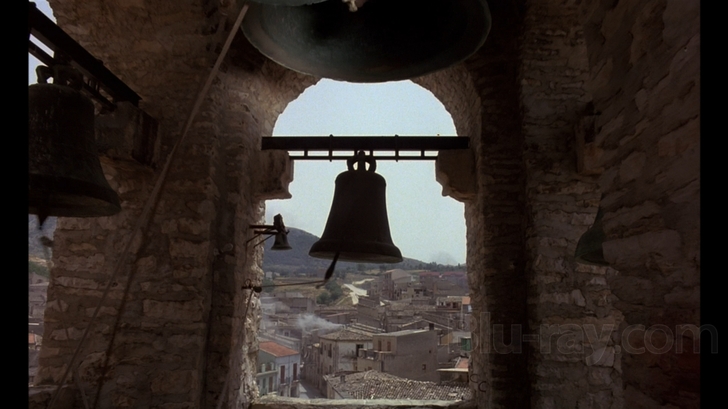
Cinema Paradiso never had a very aggressive sound design, and that lack of a "wow" factor carries through to the lossless DTS-HD Master Audio mono mix (in the original Italian, with optional subtitles) offered on this Blu-ray. There's nothing horrible about this mix in any way, shape or form, other than its obvious narrowness. Dialogue is crisp and clear and Ennio Morricone's achingly evocative score sounds fantastic. The film is rather small scale, from a sound design standpoint, and while a 5.1 repurposing may have added some space and depth to the crowd scenes inside the theater, or a couple of sequences in the town square, otherwise there probably wouldn't have been much to gain from such a surround revision. Fidelity is very strong, with excellent dynamic range, and the soundtrack has no damage to report.
Cinema Paradiso Blu-ray Movie, Special Features and Extras 
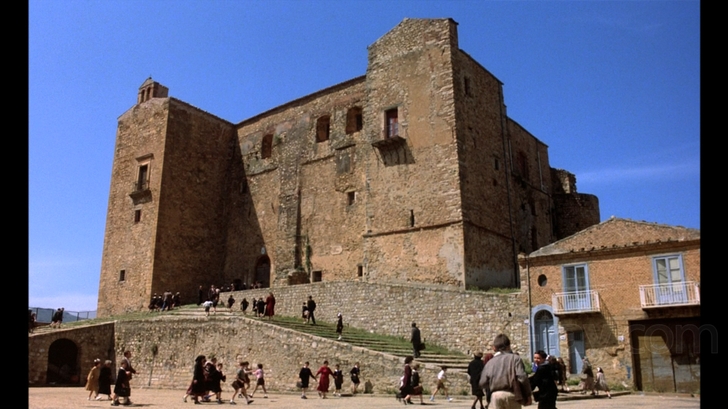
Theatrical Trailer (SD; 1:38)
Cinema Paradiso Blu-ray Movie, Overall Score and Recommendation 
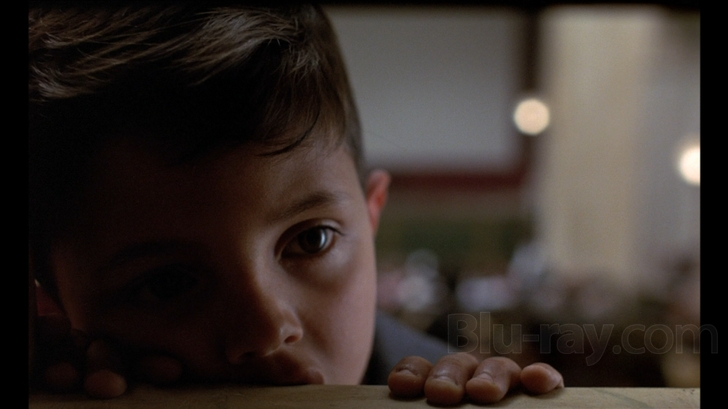
I am unabashedly in love with Cinema Paradiso in both of its versions. It's true that the two versions impart substantially different messages, but the core of an inordinate love for cinema speaks directly to my heart in either version of the film, and should to yours, too, if you go slightly ga-ga over films from time to time (or even a lot of the time). This is a sweet, heartfelt and beautifully crafted film that is wonderfully affecting, and most will have a major lump in their throat, if not a tear on their cheek, as the film comes to a close. Highly recommended.
Other editions
Cinema Paradiso: Other Editions

Cinema Paradiso
Nuovo cinema Paradiso
1988

Cinema Paradiso
Nuovo cinema Paradiso / Arrow Academy
1988

Cinema Paradiso
Nuovo cinema Paradiso / Exclusive Slipcover
1988

Cinema Paradiso
Special Edition | Nuovo cinema Paradiso | Arrow Academy
1988

Cinema Paradiso 4K
Nuovo Cinema Paradiso 4K | Director's cut on BD | Arrow Academy | Special Edition
1988
Similar titles
Similar titles you might also like

Amarcord
1973

I Vitelloni
1953

The Great Beauty
La grande bellezza
2013

Moonrise Kingdom
2012

We Are the Best!
Vi är bäst
2013

The Conformist
Il Conformista | 4K Restoration
1970

Umberto D.
1952

1900
Novecento | Three-Disc Collector's Edition
1976

20th Century Women
2016

Baarìa
2009

Bicycle Thieves
Ladri di biciclette
1948

Reality
2012

Il Sorpasso
The Easy Life
1962

Adua e le compagne
Adua and her Friends
1960

The Hunt
Jagten
2012

La Dolce Vita
1960

Small Change
1976

Cemetery of Splendor
2015

Roma
Fellini's Roma
1972

Pain and Glory
Dolor y gloria
2019
